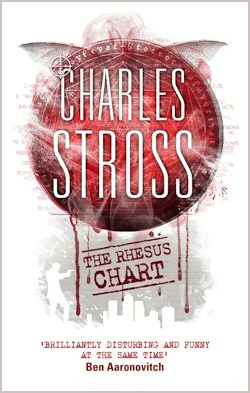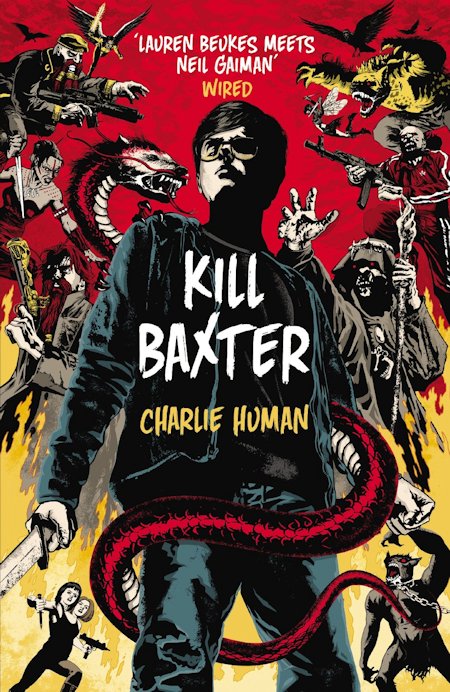Welcome back to the British Genre Fiction Focus, Tor.com’s regular round-up of book news from the United Kingdom’s thriving speculative fiction industry.
We kick off this week’s column with a couple of choice comments courtesy of Charles Stross on the consequences of the clash between Amazon and Hachette, followed by an account of the problem’s origins in the early history of the industry, and the positing of a possible future wherein all fiction is free thanks to a vast online library.
Later on, Joey Hi-Fi’s cover art for Kill Baxter leaves me mostly cold; and in Odds and Sods, Snorri Kristjansson wonders where the hell his swimming pool is, Gillian Flynn reimagines Hamlet, and Alan Moore aspires to revolutionise reading. You’ve got to give it to the guy—he aims high!
“A Malignant Monopoly”
It will be news to no-one that Amazon has been having it out with Hachette in recent weeks. Tor.com has expressed its position on the issue perfectly already: they’re all about the authors affected, never mind picking sides—and far be it from me to complicate matters farther, particularly considering that the consequences of the clash haven’t hit the UK yet.
Despite that, this has been big news in Britain, not least because the novel is a commodity that goes beyond borders, such that the country’s most successful exports are sure to suffer the fallout from this squabble as much as most authors of American origin.
Thus far, Charles Stross hasn’t felt the effects of the fight, though there’s a very real possibility he will if the world’s biggest bookseller opts to widen its field of fire. Here, then, is the owner and operator of The Laundry on Amazon’s “malignant monopoly”:
Last week, Amazon.com began removing the pre-order links from titles by the publishing group Hachette. This is a cruel and unpleasant action, from an author’s point of view; if you’re a new author with a title about to come out, it utterly fucks your first-week sales and probably dooms your career from the outset. And if you’re someone like me, with a title about to come out, it frustrates and irritates your readers and also damages your sales profile and screws your print run (because if Amazon don’t order your books in advance in dead-tree form they don’t get printed, and if they aren’t printed and in the warehouse they can’t be sold elsewhere). Make no mistake: Hachette may be hurting, but the people who take the brunt of this strategy are the authors.
And the consumers, of course, as the author of The Rhesus Chart and Neptune’s Brood concludes:

Amazon’s strategy against Hachette is that of a bullying combine the size of WalMart leaning on a much smaller supplier. And the smaller supplier in turn relies on really small suppliers like me. It’s anti-author, and in the long term it will deprive you of the books you want to read.
Days later, in a fascinating footnote, Stross elaborated on how this happened by asking how the origins of the publishing industry play into the problems facing it today:
The problems are structural in the industry, but they’re not an accident: they’re a result of the way the (current) industry emerged. Publishing is a very old business—it’s been around in some shape or another for over 500 years, and in much its current shape since the mid-Victorian period—and the way publishers do business is the intersection of the set of all business practices that did not cause one of their antecedents to go bust, over a roughly 250 year period.
[…]
So reforming the publishing industry is a very non-trivial undertaking.
Which is also why Jeff Bezos picked it as his #1 target when he founded Amazon. He set out to disrupt an incumbent mature industry using the internet, and picked publishing because it was obviously the most dysfunctional. After all, if he’d gone after groceries he’d be competing with sharks like Tesco and WalMart.
But the trouble with disruption is that it’s dangerously close to detonation. You can end up destroying what you sought to shake up and take over.
And perhaps that’s the answer. Perhaps the only way to fix a fundamentally unsound structure is to tear it all down and rebuild a better, more flexible version of said. Fat chance of that happening, however.

Damien Walter, whose Weird Things have sparked discussions in the Focus before, made a rather more “modest proposal” on his blog, as regards the corner of the market Amazon’s monopoly is most momentous, i.e. the ebook business:
Nothing is going to stop writers writing and readers reading. But a future where all writers are under the thumb of one giant technology company is one I would rather not see. There is of course an obvious solution—establish an alternative ebook marketplace. But displacing an incumbent business with a $70 billion turnover is no easy task.
That isn’t to say Damien Walter doesn’t have a decent idea how to do it. He does, and here be details. In essence, he suggests an online library that does double-duty as a bookseller:
A universal library, a stable market for writers, and a self-sustaining way to limit the disruption of technology companies like Amazon on the development of human knowledge and learning. Oh and it would effectively kill ebook piracy as well. Why not?
Well, for lots of reasons, really. But if I ruled the world… sure. Though I’d insist on some sort of subscription.
Cover Art Corner: The Human Hi-Fi
I enjoyed Charlie Human’s debut. As I wrote in my review, a touch of infodumping did not “massively detract from the breakneck pace and mad imagination that [made] Apocalypse Now Now such an addictive experience,” so I was pleased as punch to hear there’d be a sequel. It’s called Kill Baxter, and it’s coming super soon.
I’m sorry. Suddenly I sound like a South Park character. Damn you, Stick of Truth!
Moving right along… the cover of Kill Baxter was recently revealed, and like the art adorning Apocalypse Now Now, it’s by Joey Hi-Fi. Alas, as much of a fan of the man as I am, I don’t know that it’s doing it for me:

Be that as it may, I can get behind the blurb:
The world been massively unappreciative of sixteen-year-old Baxter Zevcenko. His bloodline may be a combination of ancient Boer mystic and giant shape-shifting crow, and he may have won an inter-dimensional battle and saved the world, but does anyone care? No.
Instead he’s packed off to Hexpoort, a magical training school that’s part reformatory, part military school, and just like Hogwarts (except with sex, drugs, and better internet access). The problem is that Baxter sucks at magic. He’s also desperately attempting to control his new ability to dreamwalk, all the while being singled out by the school’s resident bully, who just so happens to be the Chosen One.
But when the school comes under attack, Baxter needs to forget all that and step into action. The only way is joining forces with his favourite recovering alcoholic of a supernatural bounty hunter, Ronin, to try and save the world from the apocalypse. Again.
Century Press plan to let this book loose in little more than a month. Dreamwalk with me, readers?
Odds & Sods
-
 Rites of Passage is a collection of four long speculative stories by Eric Brown coming from Infinity Plus in the imminent. I smell a possible Short Fiction Spotlight…
Rites of Passage is a collection of four long speculative stories by Eric Brown coming from Infinity Plus in the imminent. I smell a possible Short Fiction Spotlight…
- On the Solaris blog, When Gravity Falls, Paul Kearney talks about the genesis of his second novel, The Way to Babylon, which is being rereleased this week.
- Apropos of an appreciation of Elementary, Claire North wonders what folks will make of The First Fifteen Lives of Harry August in the future, when the copyright on the novel has long since lapsed.
- I’ve been worried about the wellbeing of Jo Fletcher Books ever since Quercus posted a large loss last year, but following the finalisation of the sale of the struggling publisher to Hodder, under the Hachette umbrella, Jo Fletcher herself went on record to reassure. “For those of you who might be worried about what the future holds for us,” she wrote, “I’d like to […] say that from JFB’s point of view, I can’t actually think of a better home for us.”
- With the second part of The Valhalla Saga on shelves shortly, JFB’s “resident Viking” Snorri Kristjansson wonders where the hell his swimming pool is whilst discussing getting published.
- Joining Margaret Atwood, Tracy Chevalier, Howard Jacobson, Jo Nesbo, Ann Tyler and Jeanette Winterson, Gone Girl’s Gillian Flynn is the latest addition to the illustrious line-up of authors participating in Hogarth’s Shakespeare project: an ambitious attempt to bring the best of the Bard to the attention of contemporary readers. She’ll be tackling Hamlet, apparently.
- The Wheel of Time has gotten itself a dubious new cover look from Orbit Books. But you know all about that already, right? Me, I don’t mind it.
- Orion imprint Indigo has acquired two new novels by Leigh Bardugo, author of the Shadow & Bone books, with which The Dregs shares a setting: the Grishaverse. Next Autumn, all.
- Last but not least, Alan Moore is looking to launch something called Electricomics, “an app that is both a comic book and an easy-to-use open source toolkit” that could revolutionise reading. “Rather than simply transferring comic narrative from the page to the screen,” Moore moots, “we intend to craft stories expressly devised to test the storytelling limits of this unprecedented technology.”
Niall Alexander is an extra-curricular English teacher who reads and writes about all things weird and wonderful for The Speculative Scotsman, Strange Horizons, and Tor.com. He’s been known to tweet, twoo.









